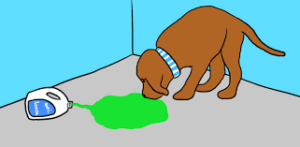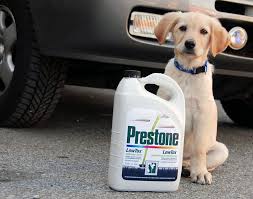Ethylene glycol is a sweet-tasting, colorless liquid used in antifreeze, brake fluid, and other industrial products. Its appealing taste can attract dogs, leading to accidental ingestion and subsequent poisoning.
Ethylene glycol, a common ingredient in antifreeze, is highly toxic to dogs. Even a small amount can lead to severe health issues and potentially fatal outcomes. This comprehensive guide aims to provide an in-depth understanding of ethylene glycol toxicity in dogs, its symptoms, treatment options, preventive measures, and frequently asked questions.
Ethylene glycol is a sweet-tasting, colorless liquid used in antifreeze, brake fluid, and other industrial products. Its appealing taste can attract dogs, leading to accidental ingestion and subsequent poisoning.
How Does Ethylene Glycol Affect Dogs?
Once ingested, ethylene glycol is rapidly absorbed from the gastrointestinal tract and metabolized in the liver to toxic compounds. These metabolites cause metabolic acidosis, kidney damage, and central nervous system depression.
Stages of Ethylene Glycol Poisoning:
Stage 1: Neurological and Gastrointestinal Symptoms (30 minutes to 12 hours post-ingestion)
- Ataxia: Loss of coordination and stumbling.
- Vomiting and drooling
- Depression or lethargy
- Seizures and coma in severe cases

Stage 2: Cardiopulmonary Symptoms (12 to 24 hours post-ingestion)
- Tachypnea: Rapid breathing
- Tachycardia: Increased heart rate
- Dehydration
Stage 3: Renal Failure (24 to 72 hours post-ingestion)
- Oliguria or Anuria: Reduced or no urine output
- Severe lethargy and weakness
- Oral ulcers and bad breath
- Painful kidneys upon palpation
Causes and Risk Factors:
Common Sources of Ethylene Glycol
- Antifreeze spills or leaks
- Brake fluid
- Certain de-icing products
Risk Factors:
- Outdoor access: Dogs with access to garages or driveways are at higher risk.
- Curiosity: Dogs that are prone to licking or tasting unknown substances.
Diagnosis:
- History and Observation: Noting recent access to antifreeze or similar substances.
- Blood Tests: Checking for metabolic acidosis and elevated creatinine levels.
- Urinalysis: Presence of calcium oxalate crystals in urine.
- Ethylene Glycol Test Kits: Specific tests to detect ethylene glycol in blood.
- To know more about FeLV [Click Here]
Treatment of Ethylene Glycol Toxicity:
Immediate Veterinary Care:
- Induction of Vomiting: If ingestion was recent and the dog is not showing severe symptoms.
- Activated Charcoal: To limit further absorption, though not always effective for ethylene glycol.
Medical Treatment:
- IV Fluids: To maintain hydration and support kidney function.
- Antidotes: Fomepizole or ethanol can inhibit the metabolism of ethylene glycol to toxic metabolites.
- Dialysis: In severe cases, to remove ethylene glycol and its metabolites from the bloodstream.
Prevention Strategies:
Safe Storage:
- Secure Containers: Ensure antifreeze and other ethylene glycol-containing products are stored in tightly sealed containers out of reach of pets.
- Clean Spills Immediately: Wipe up any spills promptly and thoroughly.
Use Pet-Safe Products:
- Propylene Glycol Antifreeze: Opt for antifreeze containing propylene glycol, which is less toxic to pets.
Supervision:
- Monitor Outdoor Access: Keep an eye on dogs when they are outside, especially in areas where antifreeze or similar substances may be present.
Conclusion:
Ethylene glycol toxicity is a severe and potentially fatal condition in dogs that requires immediate attention. By understanding the risks, recognizing the symptoms, and taking preventive measures, pet owners can protect their furry friends from this dangerous substance. In case of suspected ingestion, prompt veterinary care is essential to improve the chances of recovery.
- For more Details[Click Here]
FAQs:
Q1: How much ethylene glycol is toxic to dogs?
A1: Even a small amount, as little as a teaspoon, can be lethal for a medium-sized dog.
Q2: What should I do if I suspect my dog has ingested antifreeze?
A2: Seek immediate veterinary care. Time is critical in reducing the toxic effects of ethylene glycol.
Q3: Can ethylene glycol poisoning be reversed?
A3: Early and aggressive treatment can improve the chances of recovery, but severe cases often result in permanent kidney damage or death.
Q4: Are there any home remedies for ethylene glycol poisoning?
A4: No, ethylene glycol poisoning is a medical emergency that requires prompt veterinary intervention.
Q5: How can I make my home safer for my pets regarding ethylene glycol?
A5: Store ethylene glycol-containing products securely, clean up any spills immediately, and consider using pet-safe alternatives.

